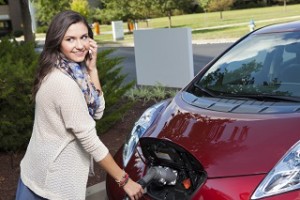From Guest Blogger Christopher Austin: Electric Vehicle or Plug-in Hybrid–Which One Is Really Clean and Green?

A lot of people invest in electric cars because of this fact alone. Deciding to pay a premium price for an electric car basically means that you’re investing in a cleaner future for the planet. However if electric vehicles are firing dirty coal, this means that we’re fooling ourselves. Environmentally conscious drivers and car aficionados are turning their attention to plug-in hybrids. Why are hybrids so appreciated?
Electric cars feature cleaner fuel that car with a gas engine
In the US, some electric cars function with coal-power electricity. This means they’re a lot cleaner than vehicles that run on gas only. Several studies have been performed on Indian and Chinese markets; the results showed that due to their weak environmental protection, most electric vehicles run on “dirty electricity”. Basically, this means that the coal used is dirty, thus making these cars less eco-friendly than car on gas.
Heavy-duty building process of electric cars
Electric car manufacturers are heavily criticized for the heavy-duty manufacturing of such vehicles. The building process is incredibly time-consuming, not to mention that the resources required abound (energy and minerals). Back in 2012, a report published by the UCS compared the cost factors of climate change emission footprints of both gas and electric vehicles. The results of the research showed that the intensity of greenhouse emissions vary when different electricity sources are used. It is clear enough that wind power and solar energy are the best to general electricity; however, in the case of electric vehicles the making of one car is not exactly “green”.
Electric engines vs. gasoline engines
When it comes to gas-powered cars, increased fuel efficiency means that less gasoline is burned/mile; a fuel sipper of 40 miles/gallon is cleaner than a gas hog with 18 miles/gallon. But then again, the fuel used in electric cars is not measured in gallons. So how can we compare the green gas effect? The initial step is to evaluate the impact of the greenhouse gas when charging an electric car using an electric source; then the impact must be compared against a vehicle using gasoline.
Solar and wind power to produce energy for electric-powered vehicles
Solar and wind power are preferable over natural gas in many niches, not just auto. Even though these options are an intermittent source of energy, the issue can be easily fixed with a grid storage system to maintain the energy production. As a matter of fact, this is a role manufacturers want electric vehicles to play. Electric cars that are parked can be considered a serious electrical storage system providing that they’re hooked to the power grid. Manufacturers have high hopes for electric vehicles. The technology is still under development and the prices will soon become price-competitive.
Should you invest in a hybrid or an electric car?
Hybrid cars are exactly what the name suggests – a hybrid, meaning a vehicle that is plugged in. Chevrolet Volt, Cadillas ELR, Lexus CT Hybrid with its Lexus spare parts, and Toyotal Prius Plug-In are just some examples. In essence, these vehicles run on 2 powertrains – gas and electric. When the electric engine is consumed, the vehicle switches to gasoline. On the other hand, we have fully-electric vehicles. Most popular examples are Tesla Model S, Ford Focus Electric, and Nissan Leaf. These run on an electric engine and they don’t have a backup.
Are electric vehicles more eco-friendly than hybrids? Yes, because they don’t feature a second engine that runs on gasoline. Those looking to minimize carbon footprint and really “go green” should definitely choose an electric car. Last but not least, full-electric vehicle are more affordable and they’re cheaper to maintain since there’s no need for driver to fill them with gas.

From the article: “Solar and wind power are preferable over natural gas in many niches, not just auto. Even though these options are an intermittent source of energy, the issue can be easily fixed with a grid storage system to maintain the energy production. ”
Unfortunately, the issue CANNOT be easily fixed with a grid storage system. If such storage systems were practical and readily available, people with PV panels on their roofs would not be maintaining their connections to the grid. Storage is available, but storage systems which are large enough to make renewables reliable are not yet practical and there is no guarantee that they ever will be.
If more people were aware that renewable power systems cannot provide reliable power without storage and that storage is not currently practical on the required scale, there would be a stronger push for power systems that can provide reliable and continuous power without emitting CO2.
The portion of the article which I quoted clearly and inescapably indicates that not everyone is aware of the limitations of intermittent sources of power.